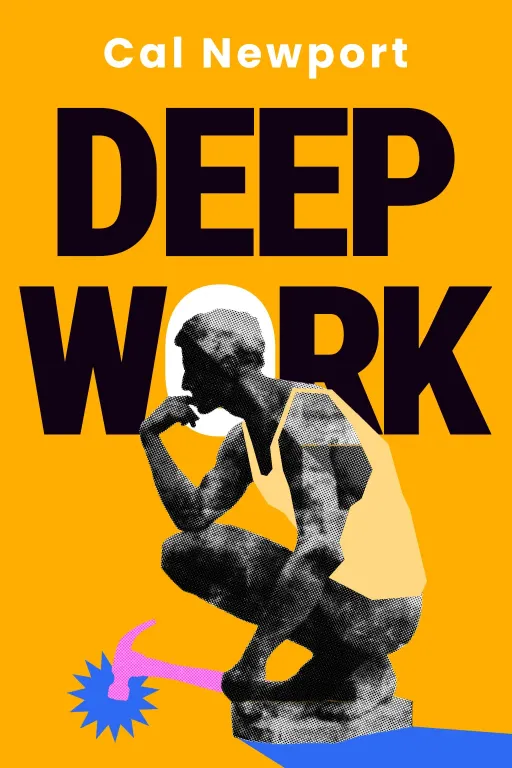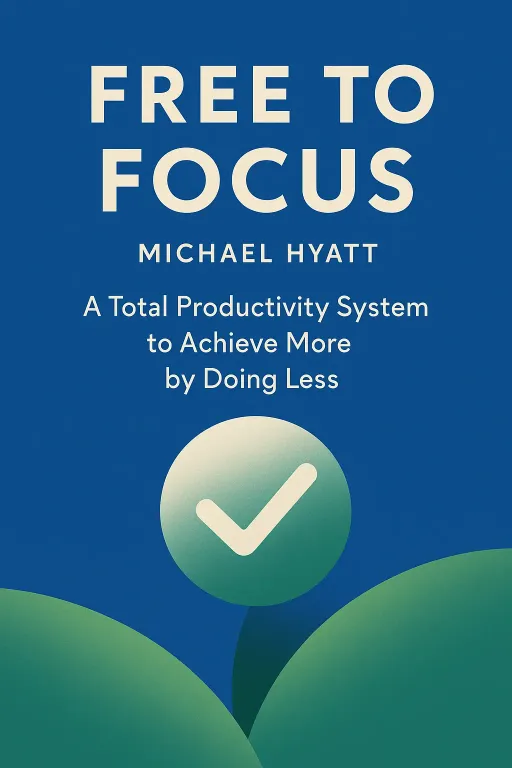
Redeeming Your Time
13 min7 Biblical Principles for Being Purposeful, Present, and Wildly Productive
Introduction
Narrator: Imagine being in a small boat, tossed about by a violent storm on a vast sea. The waves crash over the sides, the boat is filling with water, and panic sets in. This is the scene the disciples of Jesus faced on the Sea of Galilee, a moment of being utterly swamped and overwhelmed by forces beyond their control. For many today, this feeling is deeply familiar. It’s the feeling of being swamped not by water, but by emails, to-do lists, and the relentless demands of a 24/7 world. We are constantly busy, yet we feel unproductive and perpetually behind.
In his book, Redeeming Your Time, author Jordan Raynor argues that the solution to this modern crisis of overwhelm is found by looking back to the life of Jesus. He proposes a radical, gospel-centered approach to productivity, one that offers peace before productivity, not as a result of it. The book unpacks seven biblical principles designed to help individuals become purposeful, present, and wildly productive, not for the sake of efficiency alone, but to better serve God and others.
Start with the Word
Key Insight 1
Narrator: Before one can manage time, one must understand the Author of time. Raynor’s first principle is that redeeming time begins with knowing God’s purpose for the world and our place in it. He illustrates this with the life of William Wilberforce, an ambitious 18th-century British Member of Parliament. Initially, Wilberforce used his time to pursue personal power and fame. But at age twenty-six, a profound religious conversion changed everything. He wrote in his journal, "I condemned myself for having wasted my precious time, and opportunities, and talents."
Seeking guidance, he met with John Newton, the writer of "Amazing Grace," expecting to be told to leave the corrupt world of politics. Instead, Newton encouraged him to stay and serve God right where he was. This new purpose transformed Wilberforce’s approach to time. He became ruthlessly disciplined, scheduling his sleep, carrying paper to capture ideas, and seeking solitude to pray and think. His focus shifted from self-aggrandizement to a monumental task: the abolition of the slave trade. Wilberforce’s life demonstrates that true productivity isn't about finding the right app; it's about aligning our finite time with an eternal purpose.
Let Your Yes Be Yes
Key Insight 2
Narrator: Our minds are not designed to be storage units. Raynor explains that much of our modern anxiety stems from what psychologists call the Zeigarnik effect—the tendency for uncompleted tasks to dominate our thoughts. These "open loops" are the unkept promises we make to ourselves and others, and they create constant, low-grade stress. The story of Mozart pranking his father illustrates this perfectly. Young Mozart would play a rising scale on the piano but intentionally leave off the final, resolving note. His father, a disciplined musician, couldn't bear the unresolved tension and would be forced to get out of bed to play the last note before he could find peace.
Our brains work the same way. Every uncaptured idea or unfulfilled commitment is an incomplete scale that drains our mental energy. The solution, Raynor argues, is to externalize these commitments into a single, trusted system. This isn't about finishing everything at once. Research by Dr. Roy Baumeister showed that simply making a plan and writing down the next steps is enough to quiet the mind and eliminate the Zeigarnik effect. By ensuring our "yes" is captured and tracked, we honor the biblical command to be people of our word and free our minds to be fully present.
Dissent from the Kingdom of Noise
Key Insight 3
Narrator: In the 1950s, Martin Luther King Jr. found himself at the center of the Montgomery bus boycott. His life became a whirlwind of constant demands. He later wrote, "I felt terribly frustrated over my inability to retreat, concentrate, and reflect." He realized this lack of quiet was not just harming him, but the entire movement. To find the silence he needed to think and hear God, he moved his family to Atlanta. This intentional retreat from noise was essential for his leadership.
Raynor argues that we live in a "kingdom of noise," a world of infinity pools of content on social media, endless news cycles, and constant digital pings. This noise makes us less creative, more anxious, and deaf to the voice of God. To redeem our time, we must actively dissent. This means replacing infinite, unfiltered content like social media feeds with finite, filtered content like books. It means "parenting our phones" by setting bedtimes for them and getting comfortable with the quiet cracks and crevices of our day, like waiting in line, without immediately reaching for a distraction. Silence, Raynor contends, is not empty space; it is the colander that helps us sift through life’s inputs and find clarity.
Prioritize Your Yeses
Key Insight 4
Narrator: When Tamika Catchings was in seventh grade, she wrote a goal on a piece of paper and pinned it to her mirror: "One day I’ll be in the NBA." At the time, the WNBA didn't exist. Her goal was audacious, but it gave her a powerful filter for her time. She knew what her primary "yes" was, which made it easy to say "no" to things that didn't serve that goal. She eventually became a WNBA legend and a four-time Olympic gold medalist.
Raynor explains that we must prioritize our commitments because not all tasks are created equal. He points to the 80/20 Principle, which states that 80 percent of results often come from just 20 percent of our efforts. Jesus modeled this perfectly. After a long day of healing, an entire town gathered to see him. But instead of staying, he told his disciples, "Let us go somewhere else... That is why I have come." He was clear on his primary mission—preaching the gospel—and he refused to let urgent, but less important, demands distract him. To redeem our time, we must identify our most important callings and goals, allowing them to dictate how we spend our energy.
Accept Your Unipresence
Key Insight 5
Narrator: The celebrated author C.S. Lewis lived for many years with Mrs. Moore, the mother of a friend who died in World War I. While he cared for her deeply, she became a source of constant interruption, inventing crises and demanding his attention. It was only after she moved to a nursing home that Lewis’s productivity exploded. In the next six years, he published ten books, including Mere Christianity and the Chronicles of Narnia. He was finally free to do deep work.
Raynor uses this story to illustrate the principle of "unipresence"—the reality that we can only be in one place, doing one thing, at one time. Multitasking is a myth. When we switch between tasks, we leave behind "attention residue," which impairs our cognitive performance. A University of London study found that the distraction of an unread email can lower our effective IQ more than smoking marijuana. To do our best work and be truly present with others, we must fight the five enemies of depth: external distractions, fake productivity (like constantly checking email), the quick highs of social media, a savior complex that makes us feel we must be available to everyone, and the makeshift omnipresence of trying to be everywhere at once.
Embrace Productive Rest
Key Insight 6
Narrator: Shay Cochrane, a successful photographer, found her business growth had stalled. She was worried and couldn't see a solution. Then, one night, she woke at 3:00 a.m. with a fully formed, brilliant strategy in her mind. She wrote it down, implemented it, and her company’s growth rate increased by 700 percent. Her breakthrough didn't come from working harder; it came while she was resting.
This story highlights one of the book's most counterintuitive principles: rest is productive. Raynor outlines three God-designed rhythms of rest. First are bi-hourly breaks, as our brains naturally cycle between high and low alertness every 90 minutes. Second is nightly sleep, which research shows is critical for problem-solving and skill refinement. One study found that a one-hour increase in average sleep increases wages by 16 percent. Finally, there is the weekly Sabbath, a day to cease work and feast on God's goodness. This isn't laziness; it's a declaration of freedom from the tyranny of more. As Chick-fil-A has proven with its Sunday closures, working six days and resting one can be more productive than working all seven.
Eliminate All Hurry
Key Insight 7
Narrator: Fred Rogers was an incredibly busy man. He wrote 900 scripts, 200 songs, and 13 operas. Yet, as his biographer noted, whenever someone was in his presence, "everything slowed down." His staff called it "Fred-time." Rogers understood the critical difference between being busy—an outward condition of having much to do—and being hurried—an inner condition of the soul that makes one unable to be present.
Raynor argues that hurry is the great enemy of a spiritual and productive life. It arises when we fail to "count the cost" of our time, overcommitting ourselves without a realistic plan. The solution is to budget our time just as we budget our money. By creating a time budget—a template for an ideal day—we give every minute a name and a purpose. This doesn't create a rigid prison; it creates freedom. A budget allows us to proactively decide what matters and to protect our time for those priorities, enabling us to be busy and productive without the soul-corroding poison of hurry.
Conclusion
Narrator: The single most important takeaway from Redeeming Your Time is that true, God-honoring productivity is not a frantic pursuit of efficiency but a peaceful response to grace. The world tells us to work harder to find peace, but the gospel declares that we work from a place of peace, secure in the knowledge that our worth is not tied to our to-do list. God’s love is not contingent on our output.
This understanding frees us to embrace discipline not as a means of earning favor, but as a way to steward our time for a higher purpose. The book's greatest challenge, however, lies in the epilogue's warning against letting discipline become an idol. When we become like the elder brother in the Parable of the Prodigal Son—so focused on our own dutifulness that we cannot extend grace to ourselves or others—we have lost the plot. The ultimate goal is not a perfectly managed calendar, but a life so rooted in grace that we can work with purpose, rest without guilt, and love others with the unhurried presence of Christ himself.









